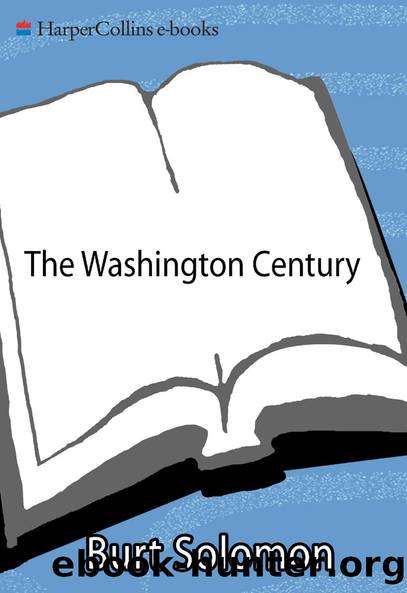The Washington Century by Burt Solomon

Author:Burt Solomon [Solomon, Burt]
Language: eng
Format: epub
Tags: History, Modern, 20th Century, United States, Biography & Autobiography, Personal Memoirs, General
ISBN: 9780062013743
Google: yM78l9XJ2uMC
Publisher: Harper Collins
Published: 2010-06-29T22:33:47+00:00
At the third annual convention of the D.C. Statehood Party, the seventy delegates stood and applauded as Julius Hobson was wheeled in. His head, nearly bald now, had sunk into his shrunken torso, as if he were a marionette whose puppeteer was dozing.
The welcome was a tribute but also a celebration. Julius was returning to politics.
The excruciating pain had eased for good and the cancer had abated, because of the poisons Tina had administered. âIâm taking acupuncture and Iâm not on dope,â he had said. âI may have a few years yet.â
Even in a wheelchair his shoes were shined.
He could concentrate again on something outside himself. Home rule, of a sort, had arrived. Ever since blacks had become a majority in D.C., many of the white residents and the business community had opposed self-rule, worried about the hue of a democratically elected government and fearful that Congress might ultimately reduce its financial support, requiring higher taxes. At least a half-dozen times the Senate had approved self-government for the capital, and John McMillan, the South Carolina segregationist who chaired the House District of Columbia Committee, prevented a vote. After an uprising of his black constituents unseated McMillan in 1972, Charles Diggs of Detroit took his place. In skin color he resembled seven in ten of D.C.âs residents.
âHome fool,â Julius called the result, because of the compromises made to pass it. The voters would elect a mayor and (as Julius put it) a âso-called City Council,â but Congress retained for itself the power of the capitalâs purse and the right to overturn any laws that the local government enacted.
Julius knew he could never defeat Walter Washington in the mayoral race from a wheelchair, but a quirk in the home rule legislation offered a political opening. Three-fourths of the voters were Democrats, yet no more than two of the four at-large seats on the thirteen-member City Council could be filled by the same political party.
âThe way these damn fools have written the law,â Julius said to his partyâs convention, âwe can win a seat or two.â
He was nominated by acclamation.
Julius spent less, and campaigned less, than most of his sixteen rivals for at-large seats. But 85 percent of the voters knew who he was. In the sparsely attended candidate forums and in âSpaghetti Liberationâ dinners in Statehood Party activistsâ homes, he promised to act as a gadfly if elected. Julius called for lifting the sales tax from food, medicine, and clothing and for petitioning Congress to authorize D.C. to tax suburban commuters. Mainly he spoke about statehood, as a simple matter of dignity. âOnly statehood,â he declared, âwill give us the same rights and powers as other U.S. citizens.â
The results in November surprised no one. Democrats placed first and second, and Julius finished a comfortable third, a Republican fourth.
Of the thirteen elected council members, eleven were black and nine had involved themselves in civil rights. âItâs going to be a radical council,â Julius surmised.
Sterling Tucker saw something else. Overwhelmingly elected by the voters
Download
This site does not store any files on its server. We only index and link to content provided by other sites. Please contact the content providers to delete copyright contents if any and email us, we'll remove relevant links or contents immediately.
Fanny Burney by Claire Harman(26603)
Empire of the Sikhs by Patwant Singh(23086)
Out of India by Michael Foss(16853)
Leonardo da Vinci by Walter Isaacson(13336)
Small Great Things by Jodi Picoult(7142)
The Six Wives Of Henry VIII (WOMEN IN HISTORY) by Fraser Antonia(5515)
The Wind in My Hair by Masih Alinejad(5095)
A Higher Loyalty: Truth, Lies, and Leadership by James Comey(4964)
The Crown by Robert Lacey(4817)
The Lonely City by Olivia Laing(4802)
Millionaire: The Philanderer, Gambler, and Duelist Who Invented Modern Finance by Janet Gleeson(4478)
The Iron Duke by The Iron Duke(4356)
Papillon (English) by Henri Charrière(4274)
Sticky Fingers by Joe Hagan(4198)
Joan of Arc by Mary Gordon(4110)
Alive: The Story of the Andes Survivors by Piers Paul Read(4033)
Stalin by Stephen Kotkin(3966)
Aleister Crowley: The Biography by Tobias Churton(3640)
Ants Among Elephants by Sujatha Gidla(3467)
